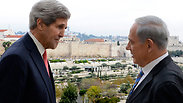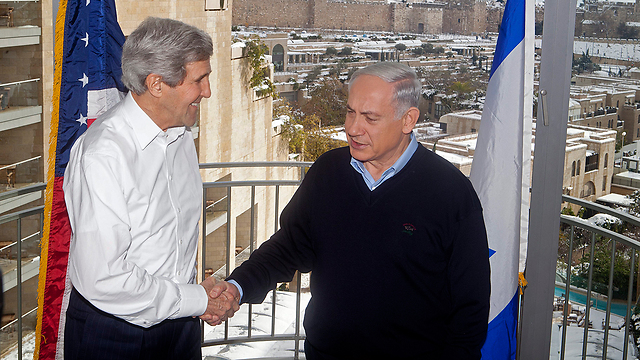
Kerry returns to Israel; wants to 'strike while iron hot'
US secretary of state, expected to arrive in region Thursday, intends to push for solutions as Israeli-Palestinian peace talks intensify
During his tenth round of Mideast shuttle diplomacy, Secretary of State John Kerry will try to get Israel and the Palestinians to agree to the outlines of a final peace agreement, but does not expect a "big breakthrough" during his trip to the region this week, a senior State Department official said Tuesday.
Kerry will test ideas for breaching gaps between Israel and the Palestinian Authority, according to the official, who spoke on condition of anonymity to brief reporters ahead of Kerry's departure on Wednesday. But the official tempered expectations, saying a "big breakthrough" was not likely during the trip.
Related stories:
- Kerry meets Netanyahu to push peace talks
- Palestinians ready to extend talks with Israel
- Has Kerry lost his mind?
After 20 rounds of talks Kerry wants to intensify talks further. "We have established very well where the gaps are, but also generated some ideas that could help to serve as ways of bridging those gaps. The secretary's trip this time is to start to test those ideas with the two leaders," the official said.
The official said Kerry "has a real sense of urgency, a real sense of need to strike while the iron is hot. We consider the iron to be hot."
"We're going to work assiduously to try to reach this framework agreement as soon as possible," the official added.
Any agreed framework would not be a signed document, but would address all core issues, including the borders between Israel and a future Palestine, security, Palestinian refugees and conflicting claims to the holy city of Jerusalem, the official said. The official also said if the parties agreed on a framework for negotiating a final peace deal, it might not be made public to avoid exposing the leaders to political pressures at home.
A framework might not even be enough to ensure a subsequent face-to-face meeting between Israeli Prime Minister Benjamin Netanyahu and Palestinian President Mahmoud Abbas , an indication perhaps that wide gaps remain.
Kerry has invested a lot of time conducting negotiations in hopes of reaching a deal within nine months. The target date expires at the end of April, and while that is not considered a deadline to end talks, there has been little, if any, tangible sign of progress so far. Asked if the framework could be achieved before April, the official said "We hope we can get it sooner," but he insisted he was not setting any deadlines.
The official said negotiators have identified gaps between the two parties, but also have generated some ideas that could help breach them. Kerry's trip, which will take him to Israel and the Palestinian territories, is to start to test those ideas with Abbas and Netanyahu, see if progress can be made and decide where to go from there.
Israeli and Palestinian politicians on Tuesday staked out "red lines" they claimed their leaders would never cross once presented with Kerry's widely anticipated proposal for the outlines of a peace deal. In Washington, the official stressed that the framework was not an American plan that would be imposed on the parties. He said a framework would outline the end point of the negotiations, rather than being an interim agreement.
Abbas struck a tough tone in a televised New Year's Eve speech, saying he would "not hesitate for a moment to say no, regardless of the pressure, to any proposal that contradicts or sidesteps the national interests of our people."
He reiterated the Palestinian demand for a state in the lands Israel captured in 1967, with east Jerusalem as a capital, and a fair solution for Palestinian refugees who, along with their descendants, today number several million people.
Abbas said he would not accept an Israeli military presence in a future Palestinian state, a reference to what Palestinians say was a US bridging proposal to maintain Israeli troops on the eastern border of that state for at least a decade. The Palestinians must have control over all of the lands of their state, along with its water resources, air space, borders and border crossings, Abbas said in his speech, which also marked the 49th anniversary of the founding of his Fatah movement.
Although the State Department said he isn't demanding final answers during this trip, it appears both leaders face tough decisions in coming weeks.
On Tuesday, the focus was on the West Bank's Jordan Valley, a strategic area along the border with Jordan that Israeli hard-liners, including members of Netanyahu's Likud Party, say must be annexed by Israel.
The Palestinian Cabinet moved its weekly Cabinet meeting to the valley to stake its claim to the area, while the pro-settler caucus in Israel's parliament said it would dedicate a new neighborhood in an Israeli settlement in the valley.
In a sign of simmering tensions, suspected Jewish vandals set three cars on fire in a West Bank village and sprayed graffiti on a wall reading "Regards to Kerry."
While the official, who is close to the negotiations, would not disclose the details of a possible framework agreement, traditional US positions on solving the conflict are known and Kerry has dropped hints, including in a policy speech earlier this month.
There has been growing expectation that Netanyahu will be asked to recognize Israel's pre-1967 war frontier as a baseline for drawing the borders of a Palestinian state, while allowing for some modifications and land swaps.
Netanyahu long has opposed this principle, apparently because it would imply Israeli readiness to give up most of the West Bank, Gaza Strip and east Jerusalem.
Palestinian officials, meanwhile, fear that Kerry will ask Abbas to recognize Israel as the homeland of the Jewish people. Abbas has rejected this in the past, with his aides saying such recognition would mean abrogating the rights of Palestinian refugees who dream of returning to lost properties in what is now Israel. The refugees, along with their descendants, now number several million people.
AP, Reuters contributed to this report
- Receive Ynetnews updates directly to your desktop











